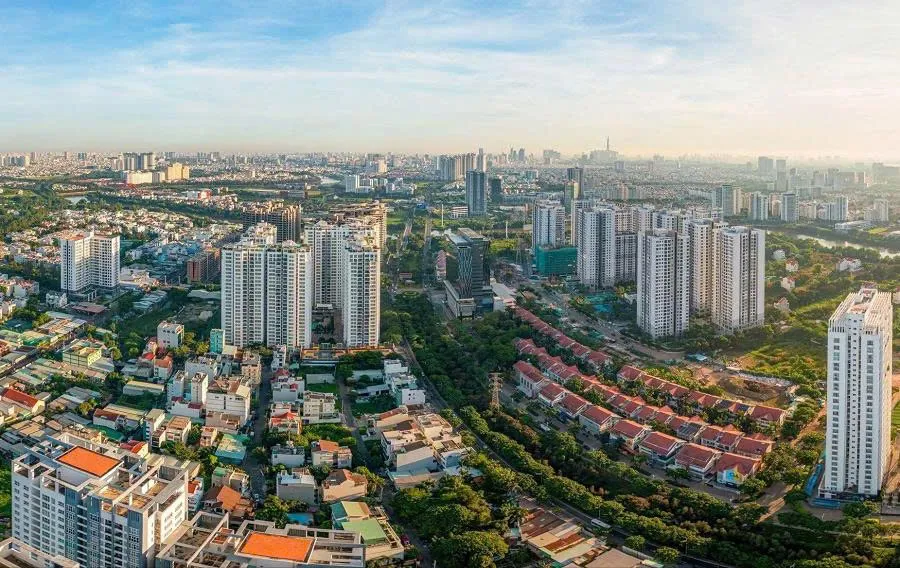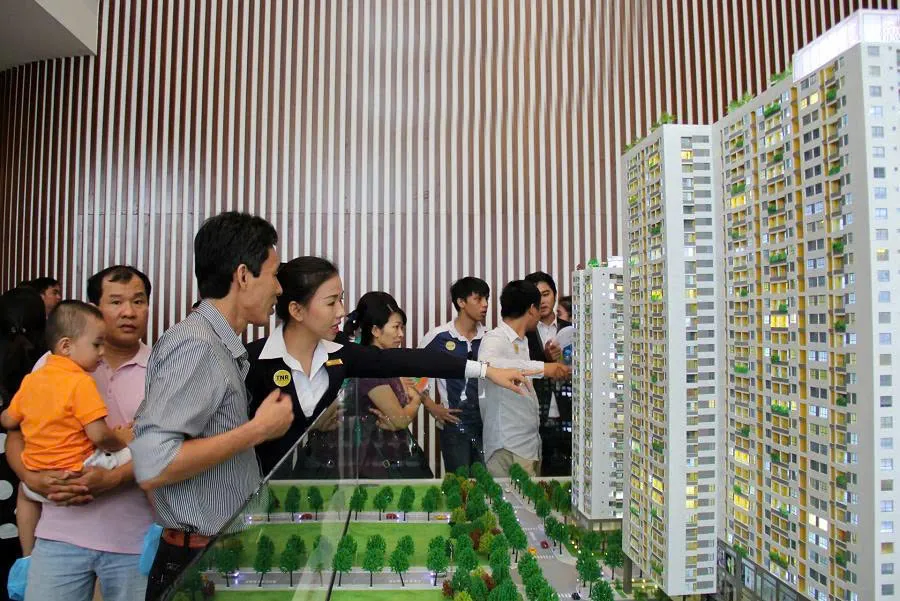Interest rates for young homebuyers capped at 5.9% per annum
The new rule about how much interest can be charged is expected to make it easier for young people to buy houses in big cities in Vietnam.
THE HANOI TIMES — From July until the end of 2025, young people under 35 who buy social housing in Vietnam will be eligible for a preferential interest rate of 5.9% per year, according to the State Bank of Vietnam.

Part of dynamic Hanoi. Photo: Kinh Te & Do Thi Newspaper
This rate is 2% lower than the average medium- and long-term lending rate in Vietnamese dong from the four major state-owned banks - Agribank, BIDV, Vietcombank, and VietinBank - for the first five years after disbursement.
For the subsequent 10 years, the rate will be 1% lower than the average market rate.
This 5.9% interest rate is specifically for social housing projects and will be available from 1 July to 31 December 2025.
This announcement offers hope to young residents in major cities such as Hanoi and Ho Chi Minh City, where high housing prices and limited income growth have long prevented many from owning a home.
Nguyen Thi Nguyet, 29, and her husband rent a 40-square-metre apartment in Ha Dong Ward, close to their workplace. Despite having saved nearly VND500 million (US$19,000) over five years, they have not considered buying a home.
Nguyen said she once hoped to purchase property in Hanoi but had to abandon the idea due to high housing costs, noting that interest rates on commercial loans may start at 3-4% in the first year but often rise to 8-9% in the second or third year, with the potential to increase further.
"For young people under 35, this is simply too expensive," she told the Voice of Vietnam.
Ha Quang Hung, Deputy Director of the Department of Housing and Real Estate Market Management at the Ministry of Construction, said that the limited supply of suitable homes is the main obstacle to affordable housing.
He told a seminar last week that project approval procedures remain lengthy and property prices have surged beyond what most people can afford.
While long-term rental or rent-to-own models are still uncommon, limiting young people’s housing options and commercial mortgage loans are expensive, with short repayment terms that do not ease financial pressure on young borrowers.
The Ministry of Construction official emphasized that young borrowers will only take out loans if they are offered fixed, low-interest rates of 5%-6% per year during the initial repayment period, even though banks are willing to lend.
Hung also acknowledged that income growth among young Vietnamese has not kept pace with rising property prices, making homeownership especially challenging.
“To buy an average 70-square-meter apartment priced between VND3 billion–VND4 billion ($114,500–$152,600) in big cities, a young person would need 20–25 years of income,” he said.
Most young couples earning VND20 million–VND30 million ($763–$1,145) per month still live with their families or rent unless they receive financial support from family or have access to subsidized loans, he added.
According to Ha Thu Giang, Head of the Credit Department at the State Bank of Vietnam, nine commercial banks have joined the program offering preferential loans for social housing purchases by people under 35, totaling VND145 trillion ($5.5 billion).
Participating banks include Agribank, VietinBank, Vietcombank, BIDV, HDBank, VPBank, Techcombank, TPBank, and MBBank. The loans come with favorable terms of up to 15 years.
As of April 30, 2025, these banks had committed VND7.8 trillion ($298 million) in loans for 38 projects, and had disbursed half of this amount. Of this amount, VND3.3 trillion ($126 million) went to project developers, and VND585 billion ($22.3 million) went to individual homebuyers.
Dang Thu Thuy, Deputy Head of Agribank’s retail banking division, said Agribank is offering a special loan program for young people under 35 purchasing social housing until December 31, 2030, with a total value of VND10 trillion ($382 million).
Borrowers receive a fixed interest rate of 6.1% per year and have flexible collateral options, including the purchased home itself. Repayment terms are available for up to 15 years. The loan can cover up to 100% of the purchase cost, and the application process is streamlined.
Agribank is also offering another loan package under Government Resolution 33 for social and worker housing and old apartment renovation projects. This package is worth VND30 trillion ($1.1 billion) and offers an annual interest rate of 6.1% for five years.
To date, seven developers and 312 individual homebuyers have received loans from the bank, totaling nearly VND1.3 trillion ($49.6 million).
In April 2025, Agribank launched a VND10 trillion ($382 million) commercial housing loan program for public servants and individuals under 35. So far, the bank has lent nearly VND1.6 trillion ($61 million) to 710 young customers.
Notices for young home buyers
Financial experts believe that smart and safe use of financial leverage could still make homeownership possible.

It may take young home buyers some 25 years to purchase a home in major cities of Vietnam. Photo: Kinh Te & Do Thi Newspaper
Economist Vu Dinh Anh said leverage involves more than just borrowing from banks; it also involves using resources beyond one’s own, such as time, knowledge, and experience, to achieve financial goals.
He warned that leveraging carries risks and advised young people to establish three solid foundations: a clear understanding of their finances, a safe debt-to-income ratio, and a risk management plan.
Anh urged young people to choose financially suitable homes, consider smaller or affordable units, avoid speculation, use official banks with transparent rates, avoid risky lenders, and carefully read loan contracts, especially floating rates, grace periods, and repayment terms.
The economist also suggested young buyers develop detailed financial plans with spending strategies to keep loan payments under 40% of income and recommended setting aside an emergency fund covering three to six months of expenses in case of job loss or illness.
Tran Kim Chung, former Deputy Director of the Central Institute for Economic Management (CIEM), said that the policy will only succeed if it is accompanied by continued reforms in project licensing, investment procedures, and an improved environment for developing affordable housing.
“Without this, such credit policies could end up fueling mid- to high-end housing prices,” he warned.
Le Hoang Chau, Chairman of the Ho Chi Minh City Real Estate Association (HoREA), proposed that the policy be piloted in major cities like Hanoi, Ho Chi Minh City, and Danang, where large populations of young people and high housing demand exist.
He suggested periodic reviews to adjust loan terms, interest rates, and eligibility criteria in addition to credit guarantee schemes targeting informal workers or those with unstable incomes - groups that often lack the documents needed to qualify for conventional loans.
To ensure effective implementation, he recommended integrating fintech tools, digital data, and artificial intelligence for automated application reviews to streamline procedures, reduce administrative burdens, and minimize fraud risks.












